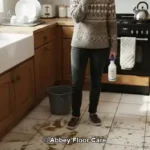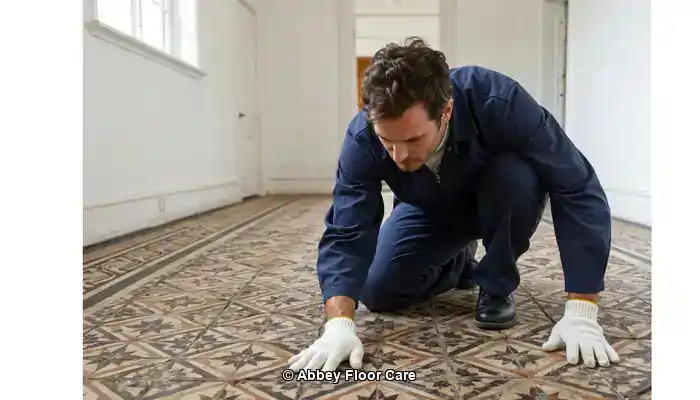
Last Updated on October 30, 2025 by David
Essential Techniques to Revitalize the Colour and Pigment of Faded Victorian Mosaic Tiles
- Victorian mosaic tiles frequently lose their colour due to embedded dirt, previous coatings, and surface wear rather than solely aging, necessitating focused efforts to restore their original vibrancy.
- Harsh chemicals and aggressive scrubbing can strip away original pigments, particularly on encaustic and geometric tiles, resulting in irreversible damage that alters their appearance.
- Safe restoration initiates with meticulous cleaning using pH-neutral solutions and low-speed rotary machines equipped with soft brushes, ensuring the tiles’ original integrity is preserved.
- Existing sealers and waxes must be carefully removed to reveal the true condition of the tile surface, preparing it for effective further treatment.
- Colour enhancement can be achieved with breathable, stone-safe sealers that deepen hues without creating an artificial glossy finish, maintaining the tiles’ authenticity.
- Professional restoration can rejuvenate original pigments without resorting to repainting or artificial colouring, thereby preserving the historical authenticity of the tiles.
- Maintaining restored tiles involves gentle cleaning routines and avoiding acidic or bleach-based products to ensure their longevity and preserve their beauty.
- Heritage-sensitive methods protect the aesthetic and historical significance of these exquisite tiles, ensuring they remain a highlight of heritage architecture.
In-Depth Overview of the Restoration Process for Victorian Tiles
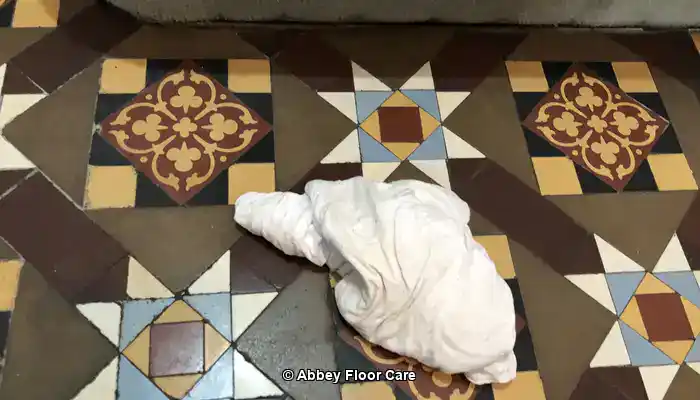
Abbey Floor Care restoring the colour to a Victorian clay tile floor using a colour-enhancing impregnating sealer.
Victorian encaustic and mosaic tiles hold immense significance within British architectural heritage, celebrated for their intricate craftsmanship and distinctive colour palettes made from mineral pigments embedded directly into the clay bodies. These tiles not only enhance the aesthetic appeal of a space but also encapsulate the artistic and historical values of their period, making their preservation crucial for future generations.
Expert Recommendations: Essential Products for Daily Care of Victorian Tiles
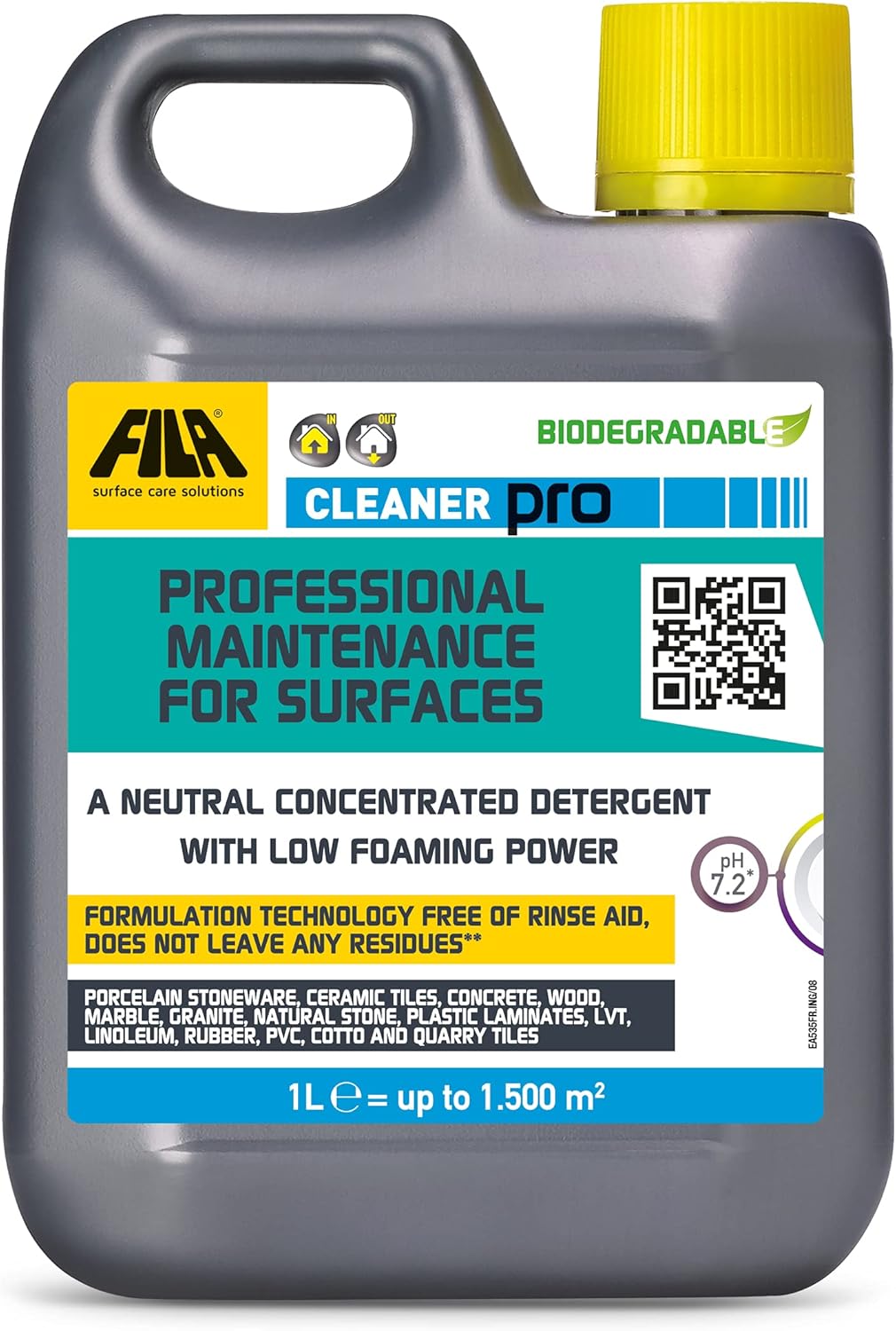
Fila Pro Floor Cleaner
|
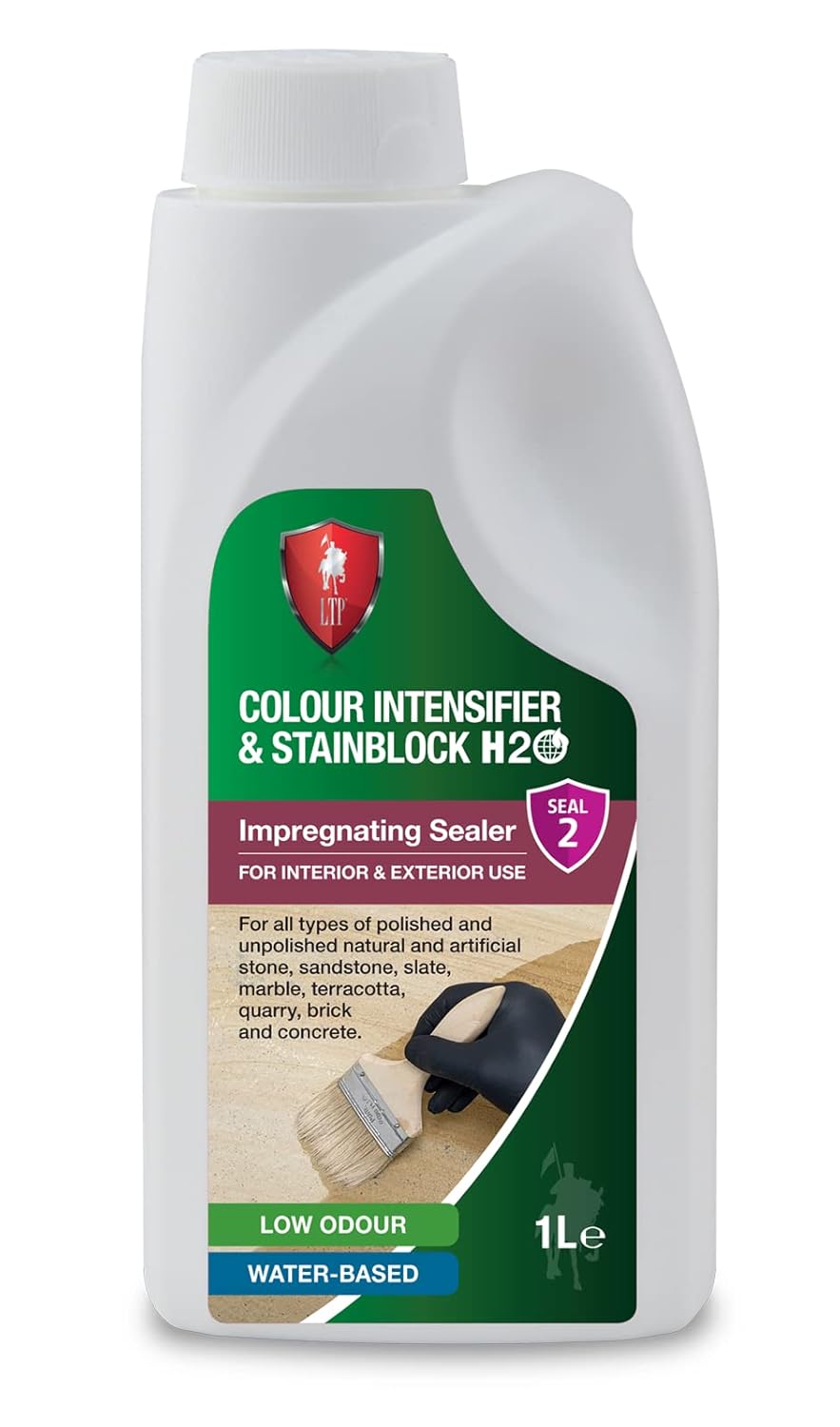
LTP Colour Intensifier & Stainblock H20
|
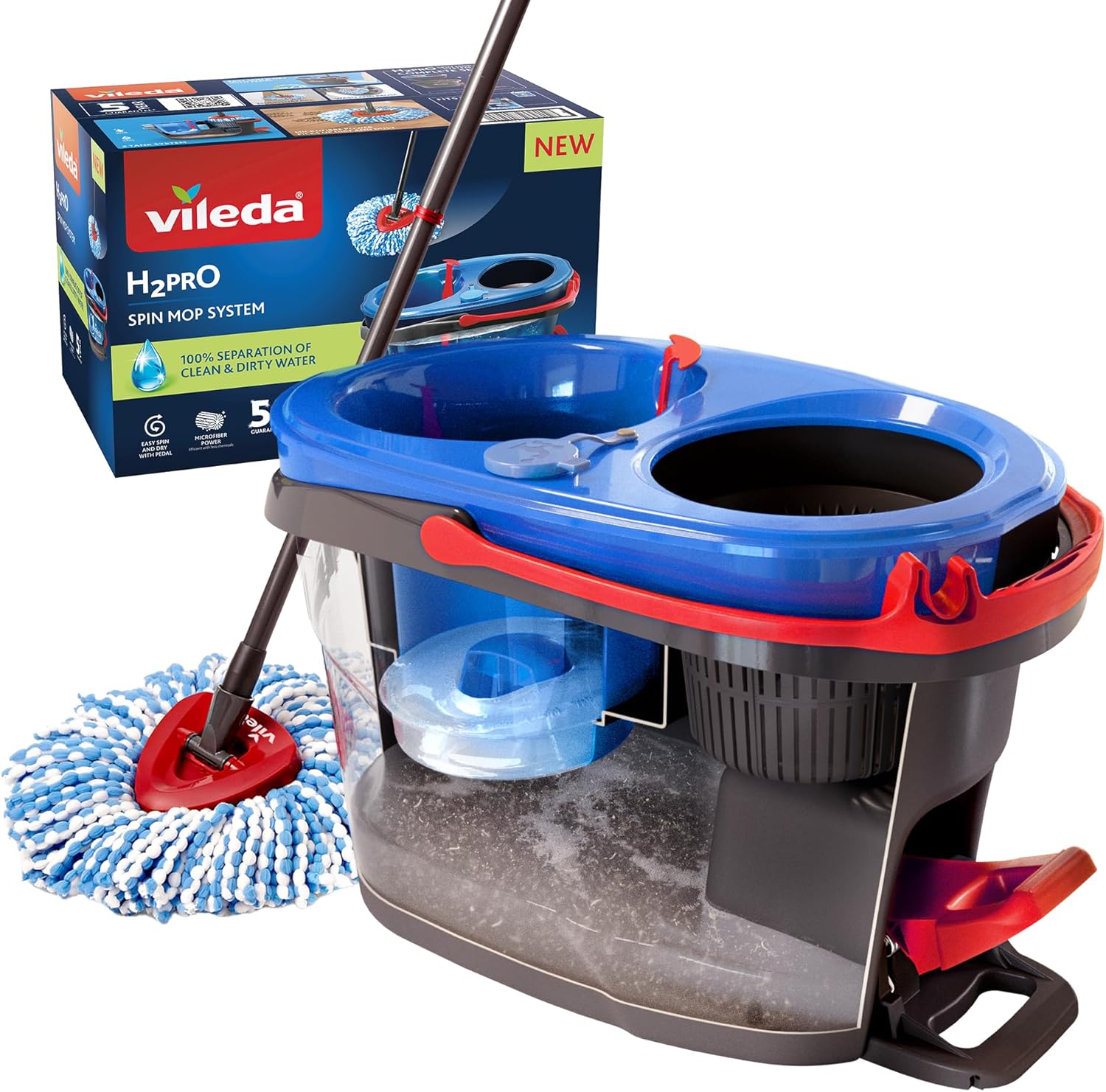
Vileda H2PrO Spin Mop System
|
Over time, however, these tiles can diminish in visual impact due to a variety of factors including surface wear, chemical reactions, and environmental influences. The process of restoring their original vibrancy is a specialized task that requires in-depth knowledge of the materials involved, historically accurate techniques, and the use of top-quality products designed specifically for this purpose. This ensures that the tiles are treated appropriately and effectively without compromising their integrity.
What Causes Victorian Mosaic Tiles to Fade and What Leads to Surface Dulling?
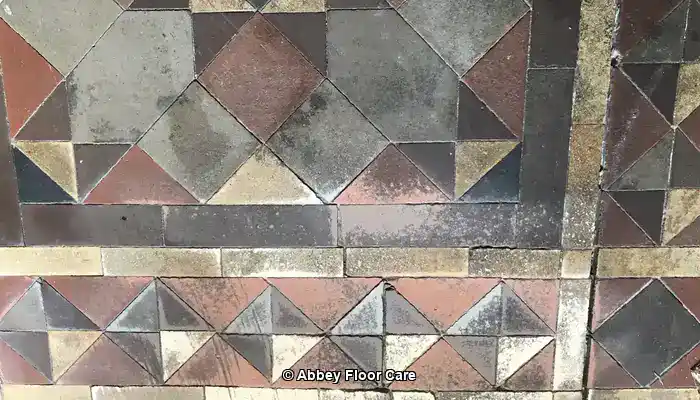
Example of Victorian Clay Tile Floor dulled through surface wear and damage.
Even though the pigments are integral to the tile composition, numerous factors contribute to fading and dulling over time, including:
- Accumulated dirt and grime: Continuous foot traffic leads to the accumulation of fine particles and oils that penetrate porous surfaces, scattering light and muting vibrant colours, thus diminishing their visual appeal.
- Wax and polish buildup: Layers of non-breathable wax or sealants can trap moisture, leading to a cloudy or yellowed appearance on the tile surface and obscuring its original beauty.
- Moisture-related issues: Many Victorian tiles were installed over subfloors that lack damp-proof membranes, resulting in rising damp that transports soluble salts. These salts crystallize on the tile surface as efflorescence, further obscuring the original tones and aesthetic appeal.
- Physical abrasion: Small surface scratches accumulate over years of wear and tear, disrupting smooth light reflection, and leading to a decrease in visual richness and depth of colour.
Effective restoration must carefully address each of these factors without compromising the historical integrity of the tile, ensuring that the final result honors the original craftsmanship and beauty of the tiles.
Why is Breathability Essential for Tiles Without a Damp-Proof Membrane?
Considering that many Victorian tiled floors are situated on older subfloors that do not include a damp-proof membrane (DPM), it is crucial that their natural clay structure remains permeable. This allows moisture from the subfloor to readily evaporate. Non-breathable wax coatings or film-forming sealers can obstruct this essential evaporation pathway, leading to moisture accumulation beneath the surface. This entrapment can cause salts and humidity to become trapped, resulting in efflorescence, degradation of surface minerals, and the undesirable phenomenon known as wax blooming, which manifests as a whitish haze or film on the tile. Restoration strategies must prioritize breathable impregnating sealers that effectively protect tiles while still allowing moisture vapour to migrate freely, thus preventing long-term damage and ensuring the tiles remain vibrant and beautiful.
Exploring the Composition of Pigments in Victorian Tiles
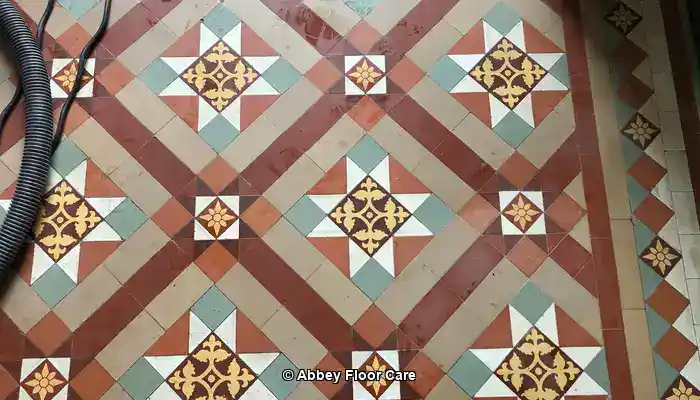
An example of different pigments in a Victorian Clay tile floor during restoration by Abbey Floor Care
Dive into the Rich Variety of Mineral Oxide Pigments Used in Victorian Tiles
Victorian mosaic and encaustic tiles derive their distinctive earthy colours from mineral oxide pigments embedded directly into the clay. These pigments not only contribute to colour depth but also enhance the overall durability of the tiles. The primary pigments include:
- Iron oxide: produces terracotta reds, rust browns, and soft ochres, adding warmth and richness to the tiles.
- Manganese: yields deep browns and rich blacks, providing depth and contrast to the overall design.
- Cobalt: imparts a variety of blue hues, allowing for striking visual elements within the tile patterns.
- Chromium: creates natural green shades, enhancing the overall colour palette available for Victorian designs.
The Firing and Fusion Process of Victorian Tiles: Ensuring Longevity
During their production, these tiles are fired at temperatures around 1100°C, which vitrifies the clay and fuses the pigments deep into the tile body. This process guarantees that the colour is consistent throughout the tile rather than merely coating the surface, resulting in lasting vibrancy that withstands the test of time and environmental factors.
The Significance of Porous Unglazed Finishes in Victorian Tiles
Victorian tiles typically showcase a porous, unglazed matte finish, lending a natural appearance that is both aesthetically pleasing and historically accurate. However, this porosity makes the tiles absorbent and susceptible to surface contamination and moisture, necessitating careful cleaning and regular maintenance to uphold their aesthetic and structural integrity throughout the years.
Understanding Variability in Colour Durability Among Different Tile Colours
Natural earth pigments, particularly in red and yellow tiles, often contain fewer mineral additives compared to darker hues like black, which generally utilize manganese. This difference means that red and yellow tiles tend to be less hard-wearing and more prone to surface dishing under heavy foot traffic. This wear can manifest as shallow depressions in areas with concentrated footfall, leading to uneven colour intensity and a loss of surface flatness over time. Recognizing these variances is essential for effective restoration and maintenance strategies.
Tailoring Restoration Techniques to Specific Tile Types
A comprehensive understanding of pigment composition and wear patterns is vital when planning restoration efforts. Softer-toned tiles necessitate gentler cleaning and customized impregnating sealers that respect their unique physical properties while enhancing colour vibrancy. In contrast, darker, more robust tiles can withstand more intensive cleaning methods but still require breathable, colour-enhancing protection to retain their vibrancy over time. This tailored approach ensures that each tile receives the appropriate care it needs to thrive and maintain its beauty.
Specialized Cleaning Techniques for Reviving Victorian Mosaic Tiles
Thorough cleaning is essential for restoring Victorian encaustic and mosaic tiles to their original vibrancy. However, cleaning these tiles demands a specialized approach that goes beyond using standard pH-neutral detergents. Professional restorers utilize carefully formulated alkaline cleaners and mechanical techniques to effectively break down heavy soiling and old residues without compromising the historical integrity of the tiles and their composition.
Initial Debris Removal: The Crucial First Step in Cleaning
The cleaning process begins with the removal of all loose dirt and grit through soft brushes or vacuuming with brush attachments. This preliminary step is critical to preventing scratches on the delicate tile surfaces during subsequent cleaning phases, thereby ensuring that the tiles remain in pristine condition throughout the restoration process.
Utilizing Alkaline Cleaners for Effective Soil Removal
In contrast to pH-neutral cleaners, which often lack the chemical potency required to address ingrained fatty acids and organic soils, alkaline cleaners are essential for effectively breaking down household oils, grease, and sticky residues frequently found on tile surfaces and within grout lines. These alkaline formulations dissolve the binding agents of dirt, sugars, and fats, facilitating their removal while ensuring compatibility with the mineral composition of Victorian tiles. Using professional-grade alkaline products, such as PS87 PRO or bespoke formulations from heritage cleaning specialists, is typically recommended in diluted forms. This ensures comprehensive cleaning without being overly aggressive on the clay body. It is important to note that, even with alkaline cleaners, caution is paramount, and spot testing is advisable to avoid potential damage.
Mechanical Agitation with Appropriate Cleaning Pads: Boosting Effectiveness
Mechanical action significantly enhances cleaning efficacy. Low-speed rotary scrubbers fitted with non-abrasive red or, occasionally, green pads are commonly employed to agitate soils from small pits, tile surfaces, and grout lines. These pads ensure thorough cleaning while preserving the integrity of tile edges and delicate surface details, thus maximizing the restoration process and the tiles’ overall aesthetic.
Removal of Old Waxes and Sealants: A Critical Restoration Step
Years of use often lead to the buildup of old waxes and sealants, particularly from DIY attempts involving inappropriate products. Water-based cleaners—whether alkaline or mildly acidic—are preferred for removing these residues without causing damage to the tile’s mineral structure. However, stubborn ‘exotic’ or solvent-resistant coatings necessitate targeted solvent-based removers such as Lithofin Wax-Off or LTP Solvex. These solvents efficiently soften and emulsify waxes and old sealants but must be handled with care by professionals trained in their safe application and disposal to prevent damage to the tiles.
Rinsing and Drying: Preparing for Restoration
Following chemical cleaning, thorough rinsing is essential to eliminate all cleaning residues. Multiple rinses with clean water, combined with wet vacuum extraction, ensure that no detergent or solvent traces remain to interfere with subsequent restoration coatings. The drying time can vary based on environmental conditions, such as humidity levels, surface type, and moisture content. Restoration experts consistently utilize moisture meters to confirm that the tiles are completely dry before applying any impregnating sealers or protective treatments. This approach prevents moisture entrapment, which could otherwise lead to efflorescence, staining, or damage beneath sealed layers, thereby ensuring the longevity and success of the restoration work.
The Benefits of Comprehensive Cleaning: Setting the Stage for Revitalization
Thorough cleaning reveals the actual condition of the tiles by eliminating visual obstructions. It exposes areas that may need repair and provides a clean, receptive surface for colour-enhancing impregnators or other restorative products. This meticulous preparation is vital to the success and longevity of Victorian mosaic tile restoration, ensuring that the tiles are ready for revitalization and continued enjoyment.
Enhancing Colour with Premium Impregnating Sealers: A Crucial Restoration Step
Restoration experts employ impregnating colour-enhancing sealers from reputable brands such as LTP and Lithofin, known for their advanced, heritage-approved formulations. Unlike superficial coatings, these sealers:
- Penetrate deeply into the pores of the tiles to physically enrich colour by altering light refraction, thus contributing to a more vibrant appearance.
- Maintain vapour permeability, which is crucial for moisture escape and is particularly important in older floors lacking DPM layers to prevent moisture-related damage.
- Provide durable protection against stains and foot traffic without altering the natural texture or gloss of the tiles, thus preserving their original beauty.
- Are applied in multiple light coats, with each layer allowed to penetrate before the next is applied to ensure complete uniformity and effectiveness.
These sealers directly combat fading by restoring vibrancy while preserving the breathable nature of the historic floor, ensuring long-lasting results that honor the tiles’ heritage and craftsmanship.
Repairing Damaged Tiles and Colour Tinting Techniques: Restoring Aesthetic Integrity
Tiles exhibiting chips, cracks, or missing sections require meticulous repair using tinted epoxy or lime-based mortars, colour-matched with natural mineral oxides to maintain aesthetic consistency. Restoration specialists source matching replacement tiles from salvage archives to ensure pattern continuity and historical accuracy. Colour tinting involves the selective application of wax or resin mixtures infused with earth pigments to sensitively blend worn or missing sections of the pattern while respecting the tiles’ breathability and reversibility to avoid future complications.
Best Practices for Effective Tinting: Ensuring Quality and Aesthetic Harmony
- Utilize small, controlled applications to avoid excessive colouring, ensuring that the final result is aesthetically pleasing and consistent with the surrounding tiles.
- Conduct patch testing on inconspicuous areas before the full application to confirm colour match and adhesion, preventing any mismatches.
- Ensure compatibility with the impregnating sealers applied to the overall surface to maintain a cohesive appearance and functionality throughout the restoration.
Ongoing Maintenance Strategies for Sustaining Restored Victorian Mosaic Floors
To preserve the restored colour and condition of Victorian mosaic tiles, ongoing care is vital and should encompass the following:
- Regular cleaning with pH-neutral, non-abrasive detergents specifically formulated for historic tiles to prevent damage and maintain hygiene.
- Implement preventive measures, such as placing entrance mats to reduce dirt ingress and protect the tile surface from wear and tear.
- Promptly address liquid spills, especially acidic substances like vinegar or wine, to prevent surface etching and long-term damage.
- Reapply breathable impregnating sealers every 3–5 years or as needed based on observed wear to ensure ongoing protection and vibrancy.
- Monitor floors for signs of efflorescence or moisture ingress that may indicate underlying damp issues that require immediate attention and remediation.
Avoiding Common Mistakes in the Restoration of Victorian Tiles
- Steer clear of wax treatments that may obstruct breathability, lead to efflorescence, or result in wax blooming that diminishes tile appearance.
- Avoid using acrylic or polyurethane sealants that can trap moisture and contribute to degradation over time, compromising the tiles’ integrity.
- Limit the use of harsh chemical cleaners, as they can erode clay and pigments, leading to irreversible damage and loss of aesthetic appeal.
- Never repaint tiles; paint films alter their visual and physical properties and are not reversible, potentially harming the tile’s integrity and authenticity.
- Recognize and address issues in older subfloors before applying any sealants to prevent complications that may arise later, ensuring a stable foundation for the tiles.
Showcasing Successful Restoration Projects: Real-World Applications of Techniques
Numerous examples illustrate the successful application of these restoration principles:
Victorian Hallway Restoration Case Study in Sheffield: A Transformation Journey
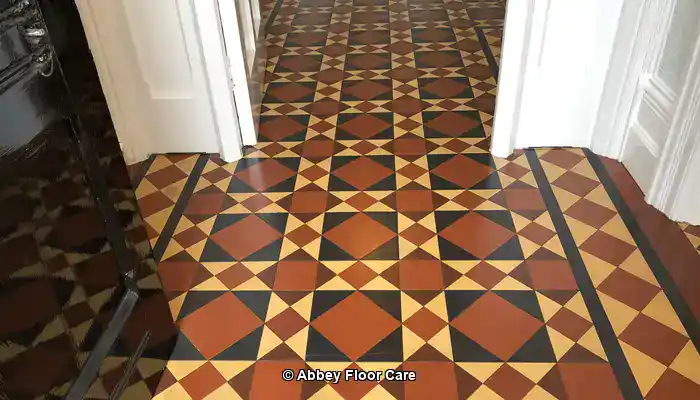
Our cleaning process effectively eliminated years of wax and grime, followed by the application of a Lantania Avo colour-enhancing impregnating sealer, which visibly deepened the colours of the tiles. This was further complemented with an acrylic topical sealer to offer surface protection on floors installed over a damp-proof membrane, ensuring longevity and beauty.
Restoration of a Civic Mosaic Floor in Chesterfield: A Heritage Revival Project
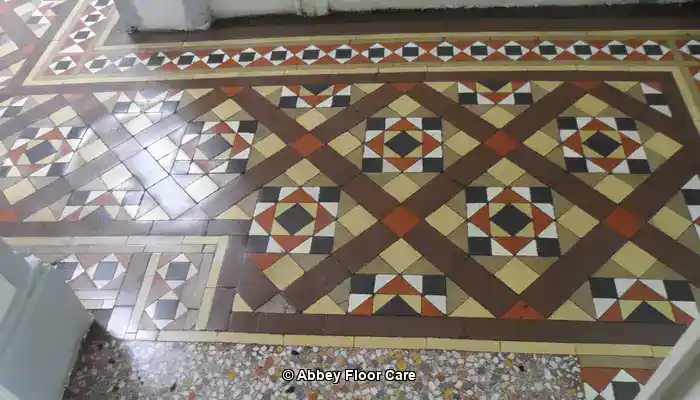
After meticulously cleaning and removing old topical sealers, the floor was treated with an LTP Colour Enhancing Impregnating sealer. The surface was further protected with a wax, carefully applied to seamlessly integrate the clay tiles with the historic fabric of the building, thereby ensuring its preservation for future generations to appreciate.
Preserving Cultural Heritage Through Expert Restoration Practices
Restoring the colour and pigment of Victorian mosaic tiles presents a multifaceted challenge that balances the principles of material science, expert craftsmanship, and sensitivity to the values of heritage. By employing premium impregnating colour-enhancing sealers from industry leaders such as Dry Treat, Lantania, and Lithofin, one can ensure long-term breathability, protection, and vibrant colour retention. The combination of skilled cleaning, careful repair, and ongoing maintenance helps maintain authenticity while revitalizing these historic floors for future generations to appreciate and enjoy.
Frequently Asked Questions About Victorian Tile Restoration: Your Inquiries Addressed
What are Victorian mosaic tiles?
Victorian mosaic tiles are decorative tiles that gained popularity in the 19th century, celebrated for their vibrant colours and intricate patterns. They were commonly used in both public buildings and private homes, representing a unique aspect of architectural history.
How can I effectively restore faded Victorian mosaic tiles?
Restoring faded Victorian mosaic tiles involves cleaning, repairing any damage, applying new pigments to match the original colours, and subsequently sealing the tiles to protect them from future wear and deterioration.
What materials are essential for tile restoration?
Key materials for tile restoration include specialized cleaning solutions, pigments, adhesives, grout, and protective sealants, all selected for their compatibility with the original tiles to ensure effective results.
How long does the tile restoration process typically take?
The timeframe for tile restoration can vary significantly based on the size and condition of the area being restored, typically ranging from a few days for smaller projects to several weeks for larger restorations, necessitating careful planning and execution.
Can I undertake the restoration myself?
Yes, smaller restoration projects can be completed as a DIY task if you possess the necessary skills and tools. However, more complex repairs require professional expertise to ensure high-quality results and avoid potential damage to the tiles.
What are the costs associated with restoring Victorian mosaic tiles?
Costs can fluctuate significantly based on project size and condition, ranging from a few hundred to several thousand pounds for comprehensive restorations, making budgeting an essential consideration for property owners.
How do I choose the right restoration expert?
Seek restoration professionals with experience in historical projects, positive reviews, and a commitment to utilizing authentic materials and techniques to ensure the preservation of your tiles and their integrity.
What challenges do restorers commonly face?
Restorers often encounter challenges such as matching original colours, repairing damaged tiles, and ensuring the longevity of the restoration work, all of which require skill, knowledge, and experience in tile restoration.
How can I maintain my restored tiles effectively?
Regular cleaning with pH-neutral products, avoiding harsh chemicals, resealing periodically, and promptly addressing any damage are essential steps for maintaining restored tiles in their optimal condition and ensuring their longevity.
What innovations are currently shaping tile restoration practices?
Recent advancements include advanced cleaning solutions, new types of sealants, and digital technology for precise colour matching and pattern replication in restoration projects, enhancing the overall quality and effectiveness of restoration efforts.
The Article Restoring Colour and Pigment to Faded Victorian Mosaic Tiles was first found on https://www.abbeyfloorcare.co.uk
The Article Restoring Faded Victorian Mosaic Tiles to Their Original Colour appeared first on https://fabritec.org
The Article Restoring Victorian Mosaic Tiles to Their Original Color Was Found On https://limitsofstrategy.com

